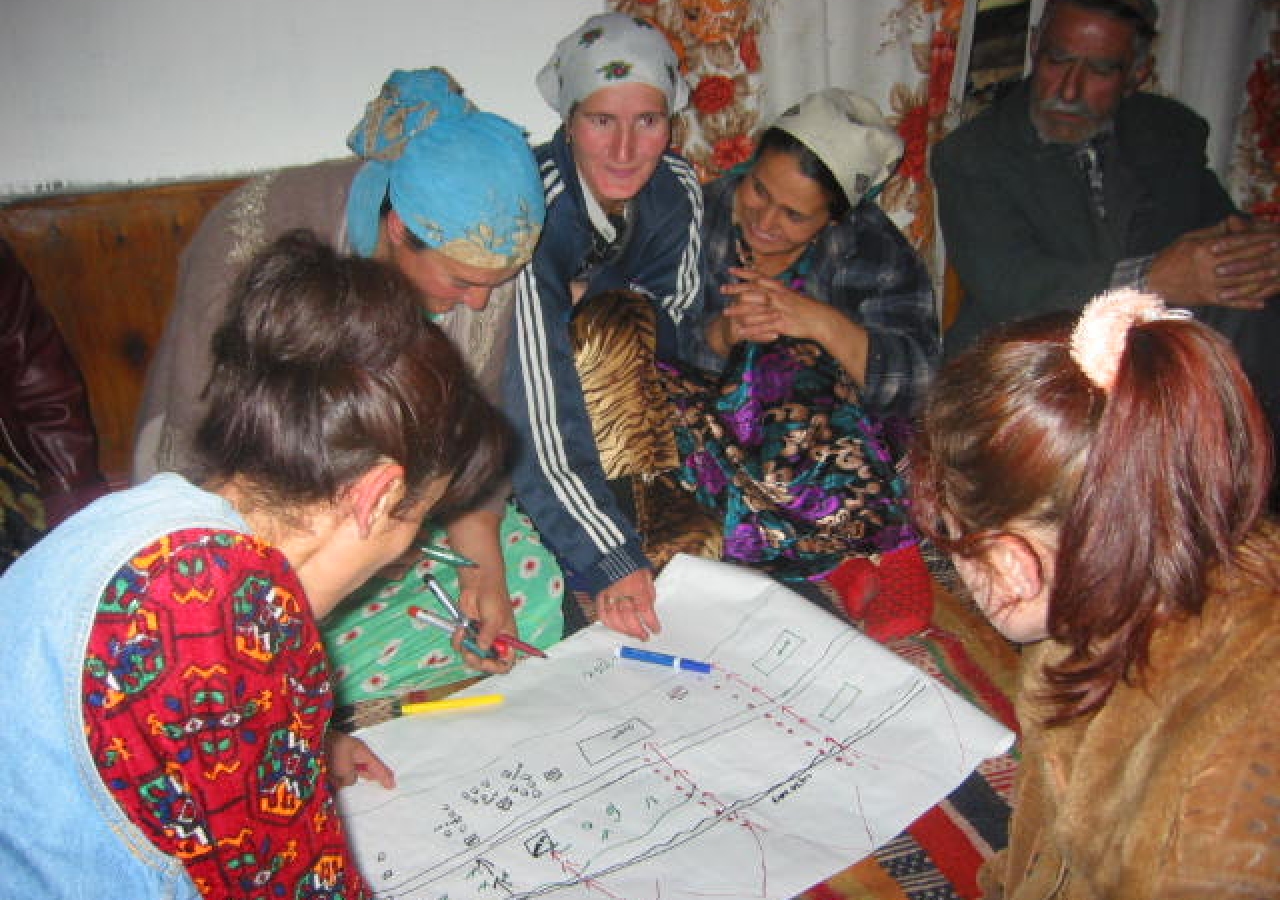 A FOCUS Community Mobiliser meets with community members in the Roshqala district in 2004, to discuss the results of a hazard and vulnerability assessment. Courtesy of FOCUS
A FOCUS Community Mobiliser meets with community members in the Roshqala district in 2004, to discuss the results of a hazard and vulnerability assessment. Courtesy of FOCUS“I know that my family and I are living in one of the most hazardous villages in the Bartang valley – mudflows occur here very often,” says 20-year-old Shabnam. She lives in the village of Shudjand, located at the entrance of the Bartang Valley in Rushan district, within Tajikistan's mountainous Gorno-Badakhshan province.
Thousands of families living in Tajikistan experience earthquakes and other hazards throughout the year that impact their lives and livelihoods. Avalanches, mudslides and flooding frequently cut off transport links and disrupt communication lines, leaving communities stranded and unable to access emergency assistance.
Such disasters can also hamper development efforts and regress improvements to quality of life. According to the European Commission's Humanitarian Aid Department, natural disasters have killed about 2 500 people and afflicted almost 10 per cent of Central Asia's population during the past decade.
Since 1994, Focus Humanitarian Assistance (FOCUS), an affiliate of the Aga Khan Development Network, has been striving to reduce the impact of natural disasters on communities – particularly those living in vulnerable areas of the developing world, such as Afghanistan, India, Pakistan and Tajikistan. Established by the worldwide National Ismaili Councils under the guidance of Mawlana Hazar Imam, FOCUS delivers emergency relief, facilitates search and rescue operations and extends recovery support during protracted crises. The organisation seeks to foster disaster-resilience in communities where it can leverage the support of community volunteers and collaborate with others in civil society, public and private institutions. FOCUS operates in Europe, Central and South Asia, as well as North America. It also works alongside Jamats in East Africa and the Middle East to help increase disaster awareness and create community response teams to support vulnerable regions.
In Tajikistan, FOCUS has been working in community-based disaster preparedness since 1997, responding to over 40 natural disasters and providing more than USD $600 000 worth of relief to communities. Through community-based initiatives, the local population is increasingly conscious of disaster prevention, mitigation and preparedness measures, as well as responding to and coping with calamities in their villages. Village planning and disaster mitigation projects have benefited over 100 000 people – including schoolchildren and teachers, government and hospital personnel, members of village communities as well as other locally-based civil society organisations.
 A FOCUS team teaches children about disaster preparedness and awareness at a summer camp held in 2006 in the Shughnan district. Courtesy of FOCUS
A FOCUS team teaches children about disaster preparedness and awareness at a summer camp held in 2006 in the Shughnan district. Courtesy of FOCUS“When I was at school, we had lessons from FOCUS about how we can be prepared for a disaster near our home, like a mudflow or avalanche,” Shabnam continues. “I learnt that we should not to be afraid of mudflows or landslides, but rather we should prepare ourselves with knowledge and skills for when they come. If we do this, then we will save many lives.”
A disaster awareness and mitigation project implemented by FOCUS has assisted some 8 000 people living in the Bartang and Pyanj river valley area to better understand the vulnerability of their location. They live in close proximity to Lake Sarez, a body of water that was formed after a massive earthquake-triggered landslide blocked the Murghab river valley in 1911. The lake, which is contained by the Usoi Dam (named for a village buried in the landslide), heightened the risks already faced by village communities in the area.
Through the project, the communities have participated in the creation of early warning systems and reinforcements such as building flood protection walls, diversion walls, creating evacuation paths and drawing up village disaster management plans. They have been equipped with new skills and knowledge, and are better prepared in the event of a worst-case flood scenario.
The challenges of living in a mountainous environment prone to natural catastrophes are a part of daily life for the people of Tajikistan. Civic participation is integral to prevention projects such as road rehabilitation, safe footbridge construction, riverbank protection, or taking part in training to learn how to use satellite radios. Supporting these programmes enables neighbourhood communities to prepare for potential threats and to respond quickly and save lives by helping one another.
 In 2001, with the assistance of FOCUS, community members built an evacuation path leading to a safe haven site near Razuj village in the Bartang valley of the district of Rushan. Courtesy of FOCUS
In 2001, with the assistance of FOCUS, community members built an evacuation path leading to a safe haven site near Razuj village in the Bartang valley of the district of Rushan. Courtesy of FOCUSShabnam was eager to join a volunteer disaster response team in her district. “I knew I wanted to be part of it and help save people's lives. The most important thing I learnt was first aid,” she said, describing the value of the training she received. “Already, my father is old, often sick and he, like many others in our village needs support during disasters. We also have many small children living in our neighbourhood and I feel it is my responsibility to help them during such times.”
“FOCUS helped us to make sure we know how to respond to these situations better than we knew before and now many of us feel it is our responsibility to be trained in disaster awareness and response.”
Iffat Salaam is the Global Communications Officer at the FOCUS International Secretariat.







